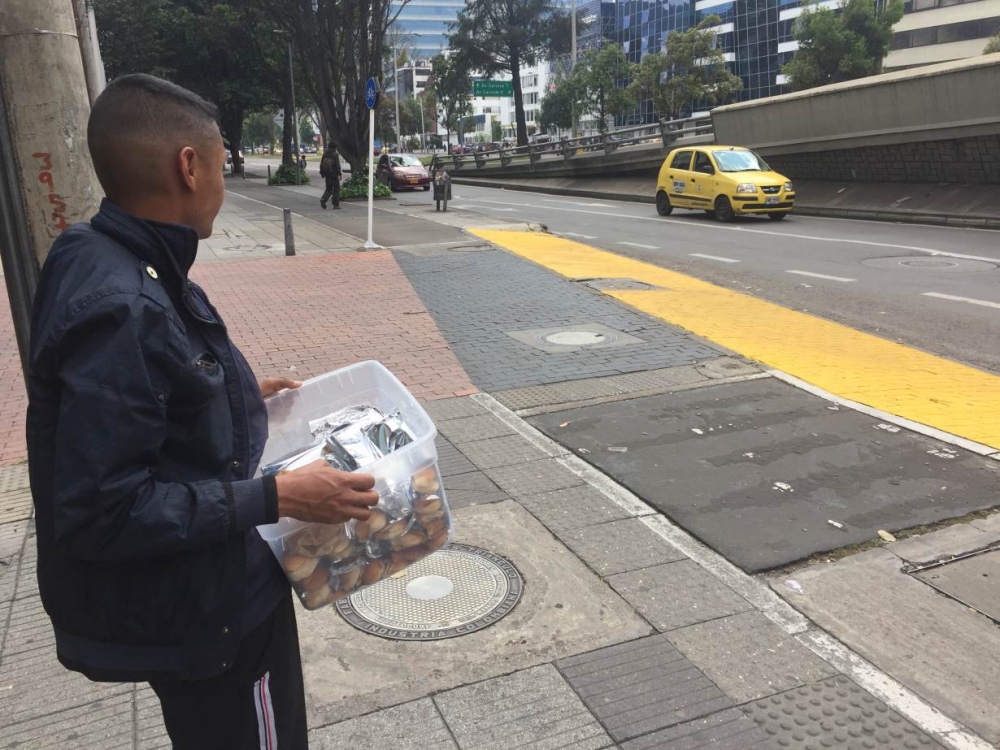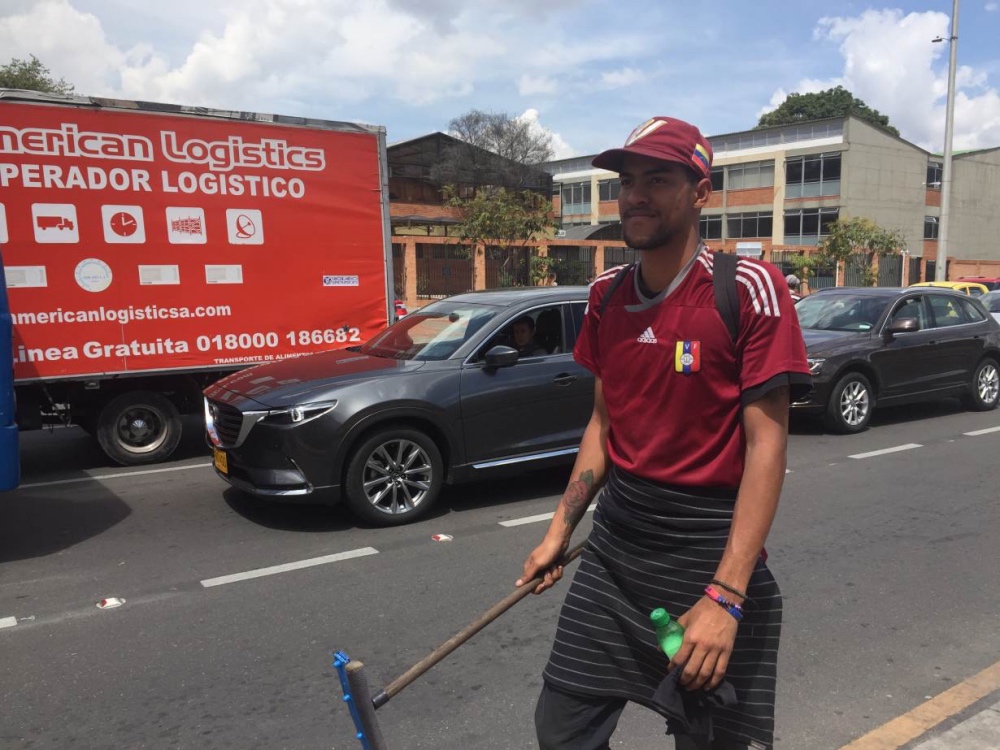
ANASTASIA MOLONEY reports from Colombia for Thomson Reuters Foundation…
Bogota, Colombia
Thomson Reuters Foundation
Venezuelan army lieutenant Alejandro Pedra once used to proudly stand guard in pristine white uniform outside the presidential palace in the Venezuelan capital Caracas, now he stands in a shabby tracksuit selling sandwiches on a street corner in Bogota.
Pedra deserted the army seven months ago, crossing the border into Colombia with his wife and young son because of his disgust with the socialist government of President Nicolas Maduro.
“I don’t agree with the dictatorship and how it has destroyed and robbed the country,” Pedra told the Thomson Reuters Foundation.
“I don’t agree with the hunger and corruption that Venezuelans are going through. Serving the dictator was a stain on my uniform and my pledge to protect my country,” said the 29-year-old, who has applied for asylum in Colombia.

Venezuelan asylum seeker and army lieutenant Alejandro Pedra stands in street selling sandwiches in Bogota, Colombia, on 30th January. PICTURE: Anastasia Moloney/Thomson Reuters Foundation
About one in 10 Venezuelans have abandoned their homeland in the past three years, fleeing economic collapse and an escalating political crisis many blame on Maduro, who has been in power since 2013.
Now, for many who have migrated, and hundreds of thousands of Venezuelans who have marched against Maduro, there is hope that change is possible after opposition leader, Juan Guaido, declared himself interim president on 23rd January.
“The opposition has gone from being completely divided internally to being more united than they ever have in years, and I think that’s leading to hope and optimism among Venezuelans that this long nightmare is over.”
– Geoff Ramsey, a Venezuela expert at the Washington Office on Latin America (WOLA).
“The opposition has gone from being completely divided internally to being more united than they ever have in years, and I think that’s leading to hope and optimism among Venezuelans that this long nightmare is over,” said Geoff Ramsey, a Venezuela expert at the Washington Office on Latin America (WOLA), a thinktank.
The United States, European Parliament, and many Latin American nations, have recognised the 35-year-old Guaido as the legitimate interim president of Venezuela, while Washington has slapped sanctions on the country’s vital oil exports.
Guaido, who heads the opposition-run congress, is offering an amnesty to Venezuela’s military.
“If I were to return with Maduro in power, I’d be considered a traitor. That would mean death or jail,” Pedra said.
“My options have changed with Guaido. I trust his offer of an amnesty. If the dictatorship ends, I’ll go back to defend Guaido. For me, Guaido is the new commander-in-chief. I want to help the transition.”
But such hope is tempered with the awareness that Maduro is unlikely to fall imminently or be easily toppled, Pedra said.
“I don’t see the generals turning so quickly against him,” he said.
And many experts agree.
“The key factor is the support of the armed forces. So far there has been no public split from Maduro within the military and it’s unlikely that we will see a transition without it,” Ramsey said.
“We have no guarantee that these oil sanctions are going to cause some sort of regime collapse but we absolutely know that the longer this situation drags on the deeper the impact will be on the Venezuelan people,” he said.
Still, for many migrants in Colombia – where more than one million have settled – Guaido offers a symbol of hope and the growing possibility that returning home could be sooner than later.
“We all want to go back to our country. With Guaido, there’s a better chance of that. Hopefully something can change.”
– Bryan Aray, a forensic doctor, who left Venezuela with his family eight months ago.
“We all want to go back to our country. With Guaido, there’s a better chance of that. Hopefully something can change,” said Bryan Aray, a forensic doctor, who left Venezuela with his family eight months ago.
He wades through traffic with this young son on his shoulders, offering worthless Venezuelan bills to drivers stuck in traffic, hoping to get a few coins in return.
“It’s humiliating having to beg for money. But I have to do this to pay the daily rent for a room. Otherwise we sleep under a bridge,” Aray said.

Venezuelan migrant Jesus Arrieche washes car windscreens in Bogota, Colombia, on 30th January. PICTURE: Anastasia Moloney/Thomson Reuters Foundation
Nearby, at another traffic light, Venezuelan Jesus Arrieche and his friend survive day to day washing car windscreens.
Like many migrants, they follow the latest news about Venezuela on Facebook and on WhatsApp.
“If Maduro falls, I’d go back tomorrow,” said 21-year-old Arrieche.
“We have faith that Guaido can topple the dictatorship. Then my relatives back home and people could get basic things like food and medicine.”
Venezuela’s rocketing hyperinflation makes food too expensive to buy for many Venezuelans, who are forced to skip meals and rummage through rubbish. Hospitals are plagued by chronic shortages of medicine and electricity cuts.
“The scale of the humanitarian need on the ground in Venezuela is catastrophic. People are dying of preventable diseases because they lack things like antibiotics or other essential medicines.”
– Geoff Ramsey
“The scale of the humanitarian need on the ground in Venezuela is catastrophic. People are dying of preventable diseases because they lack things like antibiotics or other essential medicines,” Ramsey said.
“Maduro has accepted limited humanitarian aid but he has turned down most of the offers of the international community.”
As self-declared interim president, Guaido has said his key priority is getting humanitarian aid into Venezuela.
But doing this in practice will be a challenge.
“It’s very important that Guaido has become a symbol of hope to the Venezuelan people but the simple truth is that there’s absolutely no clear way for the opposition to ensure that offers of humanitarian aid actually get to Venezuelans,” Ramsey said.
“The military controls all the points of entry on the borders, as well as every major port. So there’s no clear way to bring in aid to the Venezuelan people that doesn’t pass through the Maduro regime.”
Meanwhile, for Venezuelan migrant Andrea Banas, sitting on a patch of grass at a roadside with her daughter asleep in her lap, Guaido’s claim to the presidency means it is the first time she has contemplated returning home since she left a year ago.
“I believe in Guaido. He’s brave,” Banas said. “So far he’s shown that he loves Venezuela and the people, and has the country’s best interests at heart.”





